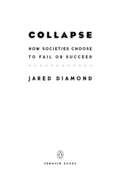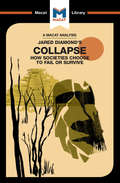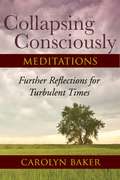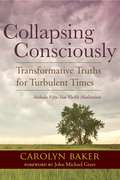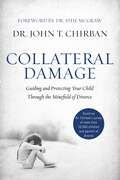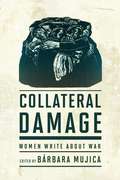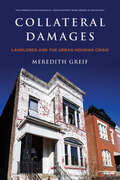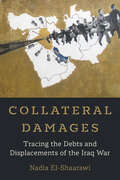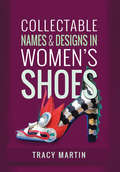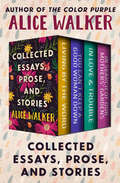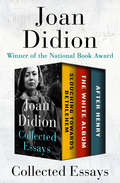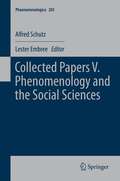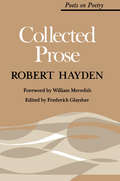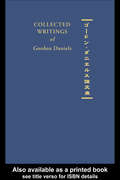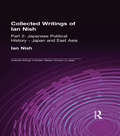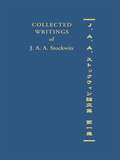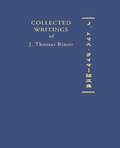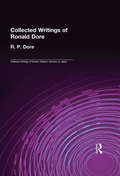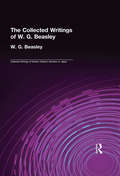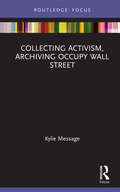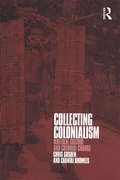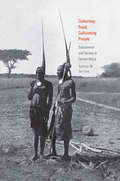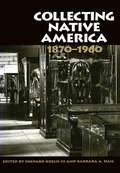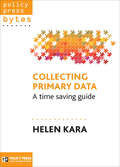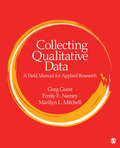- Table View
- List View
Collapse: How Societies Choose to Fail or Succeed: Revised Edition
by Jared DiamondIn Jared Diamond’s follow-up to the Pulitzer-Prize winning Guns, Germs and Steel, the author explores how climate change, the population explosion and political discord create the conditions for the collapse of civilizationEnvironmental damage, climate change, globalization, rapid population growth, and unwise political choices were all factors in the demise of societies around the world, but some found solutions and persisted. As in Guns, Germs, and Steel, Diamond traces the fundamental pattern of catastrophe, and weaves an all-encompassing global thesis through a series of fascinating historical-cultural narratives. Collapse moves from the Polynesian cultures on Easter Island to the flourishing American civilizations of the Anasazi and the Maya and finally to the doomed Viking colony on Greenland. Similar problems face us today and have already brought disaster to Rwanda and Haiti, even as China and Australia are trying to cope in innovative ways. Despite our own society’s apparently inexhaustible wealth and unrivaled political power, ominous warning signs have begun to emerge even in ecologically robust areas like Montana.Brilliant, illuminating, and immensely absorbing, Collapse is destined to take its place as one of the essential books of our time, raising the urgent question: How can our world best avoid committing ecological suicide?From the Trade Paperback edition.
Collapse: How Societies Choose to Fail or Survive
by Rodolfo MaggioAmerican scholar Jared Diamond deploys his powers of interpretation to great effect in Collapse: How Societies Choose to Fail or Succeed, which seeks to understand the meaning behind the available evidence describing societies that have survived and those that have withered and died. Why, for example, did the Norsemen of Scandinavia who colonized Greenland in the early tenth century not survive, while the inhabitants of Highland New Guinea did? With the evidence to hand, Diamond notes that a society’s collapse tends to be preceded by a severe reduction in population and considerable decreases in political, economic and social complexity. Delving even deeper, Diamond isolates five major factors determine the success or failure of human societies in all periods of history: environmental degradation, which occurs when an ecosystem deteriorates as its resources are exhausted; climate change (natural or man-made); hostile neighbors; weakened trading partners; and access or otherwise to the resources that enable the society to adapt its challenges. The breadth of Diamond’s research provides the springboard from which to reach these definitions, but it inevitably also introduces complications; how can evidence produced by specialists in so many different disciplines be compared? Diamond’s ability to understand the meaning of the evidence at hand – and his readiness to seek and supply clarifications of meaning where necessary – underpin his achievement, and comprise a textbook example of how interpretative skills can provide a framework for strong critical thinking.
Collapsing Consciously Meditations: Further Reflections for Turbulent Times
by Carolyn BakerThis collection of more than 300 meditations weaves together spiritual wisdom, inspiration, humor, and a persistent challenge to create and savor beauty in the world, regardless of how bleak the future may appear. As a companion to the book Collapsing Consciously: Transformative Truths for Turbulent Times, these additional meditations are for readers seeking profound emotional and spiritual preparation for the impending collapse of industrial civilization. Author Carolyn Baker offers wisdom, inspiration, and a sense of spiritual purpose for anyone who is concerned about the daunting future humankind has created. Instead of quoting discouraging statistics about our predicament, Baker offers a deeper perspective that makes sense of a world that most of the time appears psychotic or even surreal. Through inspiration and perennial wisdom she has created a manual for making meaning and generating joy, especially in situations that feel hopelessly devoid of both. Also available: Collapsing Consciously: Transformative Truths for Turbulent Times, ISBN 978-1-58394-712-8.
Collapsing Consciously: Transformative Truths for Turbulent Times (Sacred Activism #3)
by John Michael Greer Carolyn BakerA collection of probing essays and weekly meditations, this book addresses how to prepare emotionally and spiritually for the impending collapse of industrial civilization. Author Carolyn Baker offers wisdom, inspiration, and a sense of spiritual purpose for anyone who is concerned about the daunting future humankind has created.The author's introduction to Collapsing Consciously articulates our current predicament of economic collapse, environmental degradation, and global conflict and expresses the confusion, anxiety, grief, anger, and despair we all experience when we take a hard look at the present-day global crisis and the likely future of the planet. But rather than showing us ways to prevent the collapse, Baker argues that the demise of our consumerist, corporate culture is inevitable, and that it is crucial to prepare emotionally and spiritually for the certain changes to come.Part 1 is a collection of seventeen essays which argue that while the collapse of industrial society cannot be prevented, its meaning extends far beyond tragedy and loss. These essays ask the reader to delve inward and discover the limitless treasures of the soul, as well as the gratification and exhilaration to be discovered in joining with community in preparing for the future.In part 2, Baker offers fifty-two weekly meditations comprised of spiritual wisdom, inspiration, paradox, comfort, humor, irony, and a persistent challenge to create and savor beauty in the world, regardless of how bleak the future may appear.Collapsing Consciously is a refreshing take on the perilous present and the grim prospects for our future. Instead of quoting discouraging statistics about our predicament, Baker offers a deeper perspective that makes sense of a world that most of the time appears psychotic or even surreal. Through inspiration and perennial wisdom she has created a manual for making meaning and generating joy, especially in situations that feel hopelessly devoid of both.An ebook containing additional meditations is also available: Collapsing Consciously Meditations: Further Reflections for Turbulent Times, ISBN 978-1-58394-758-6.From the Trade Paperback edition.
Collateral Damage: Guiding and Protecting Your Child Through the Minefield of Divorce
by Dr John ChirbanBased on research from more than 10,000 surveys from children and parents of divorce, Collateral Damage presents parents with an overview of the impact that divorce has on their children and offers ways to better serve their needs at this critical time. Approximately fifty percent of marriages in the United State fail. Add to that the increasing number of couples who never marry, have children together, and later go their separate ways. In all of these scenarios, children suffer greatly—often in silence, as parents do not know how to effectively guide their kids. When the sorrow and emotional issues of children are not addressed, the cycle of divorce is likely to continue for them and in generations that follow. In addition, while children may appear to be resilient and adjusting, without proper support children of divorce are more prone to drug and alcohol abuse, criminal behavior, mental and physical illness, and suicide. How can parents manage their own hurt, shock, anger, and despair so that they can provide their children with what they need? Collateral Damage sounds a wakeup call for parents. It identifies the landmines inherent in the dangerous terrain of divorce and equips them to help their children not to feel abandoned or unheard. Topics covered include: Building the family—not losing it Tuning into your kids Stabilizing childhood Maintaining parent/child roles Avoiding the parenting handoff Keeping kids out of the war zone Instilling trust Keeping open lines of communication Attuning to guiding, spiritual resources The failure of a marriage does not mean the end of the family. Providing a stable, supportive, healthy relationship with your child demonstrates what a loving relationship looks like, better preparing them for intimate relationships and marriage as an adult.
Collateral Damage: Women Write about War
by Aminatta Forna Domnica Radulescu V. V. Ganeshananthan Christine Evans Scholastique Mukasonga Marjorie Agosín Nancy Sherman Miyoko Hikiji Carolin Emcke Michèle Sarde Bárbara Mujica Peipei Qiu Ghusoon Mekhaber Al-Taiee Florinda Ruiz Carolina Rivera Escamilla Trudy Mercadal Carmen Duarte Betty MilanFrom Homer to Tim O’Brien, war literature remains largely the domain of male writers, and traditional narratives imply that the burdens of war are carried by men. But women and children disproportionately suffer the consequences of conflict: famine, disease, sexual abuse, and emotional trauma caused by loss of loved ones, property, and means of subsistence.Collateral Damage tells the stories of those who struggle on the margins of armed conflict or who attempt to rebuild their lives after a war. Bringing together the writings of female authors from across the world, this collection animates the wartime experiences of women as military mothers, combatants, supporters, war resisters, and victims. Their stories stretch from Rwanda to El Salvador, Romania to Sri Lanka, Chile to Iraq. Spanning fiction, poetry, drama, essay, memoir, and reportage, the selections are contextualized by brief author commentaries.The first collection to embrace so wide a range of contemporary authors from such diverse backgrounds, Collateral Damage seeks to validate and shine a light on the experiences of women by revealing the consequences of war endured by millions whose voices are rarely heard.
Collateral Damages: Landlords and the Urban Housing Crisis (American Sociological Association's Rose Series)
by Meredith GreifChanges in federal housing policies over the past several decades shifted the primary responsibility for providing low-income renters with affordable housing from the government to private landlords. Federal, state, and local governments have passed laws to ensure that low-income renters are protected from illicit landlording practices. Yet we know little about how private landlords experience local housing regulations. In Collateral Damages, sociologist Meredith Greif examines how local laws affect private landlords and whether tenants are, in fact, being adequately protected. For three years, Greif followed sixty private landlords serving low- and moderate-income residents in the Cleveland, Ohio, metropolitan area to better understand how local regulations, such as criminal activity nuisance ordinances (CANOs) and local water billing regulations, affect their landlording practices. CANOs are intended to protect communities by discouraging criminal activity on private properties. Property owners can face financial and criminal sanctions if they do not abate nuisance activities, which can include littering, noise, drug use, and calls for police assistance, including calls for domestic violence. Local water billing regulations hold landlords responsible for delinquent water bills, even in cases where the account is registered in the tenant’s name. Greif finds that such laws often increase landlords’ sense of “financial precarity” – the real or perceived uncertainty that their business is financially unsustainable – by holding them responsible for behavior they feel is out of their control. Feelings of financial uncertainty led some landlords to use illegitimate business practices against their tenants, including harassment, oversurveillance, poor property upkeep, and illegal evictions. And to avoid to financial penalties associated with CANOs and delinquent water bills, some landlords engage in discriminatory screening of vulnerable potential tenants who are unemployed or have histories of domestic violence or drug use. In this sense, by promoting a sense of financial insecurity among landlords, laws meant to protect renters ultimately had the opposite effect. While some landlords, particularly those who rented a larger number of units, were able to operate their businesses both lawfully and profitably, the majority could not. Greif offers practical recommendations to address the concerns of small- and mid-sized landlords, such as regular meetings that bring landlords and local authorities together to engage in constructive dialogue about local housing policy, issues, and concerns. She also proposes policy recommendations to protect renters, such as establishing the right to counsel for lower-income tenants in eviction hearings and enacting a federal renter’s tax credit. Collateral Damages is an enlightening investigation on how local laws and practices perpetuate disadvantage among marginalized populations and communities, in ways that are hidden and often unintended.
Collateral Damages: Tracing the Debts and Displacements of the Iraq War (California Series in Public Anthropology)
by Nadia El-ShaarawiMore than twenty years after the US-led invasion and occupation of Iraq, there has yet to be a meaningful public reckoning with the war. Collateral Damages brings Iraqi stories—which have been systematically excluded from dominant Western narratives of the war—to the fore. Drawing on a decade of ethnographic fieldwork, Nadia El-Shaarawi traces Iraqis' experiences of the 2003 invasion and the violence and displacement that followed, from urban exile in Cairo to efforts to rebuild by pursuing third-country resettlement—often in the very country responsible for them becoming refugees. Iraqis' theorizations of war and displacement illuminate how prevailing histories and memories of both the Iraq War and the larger Global War on Terror can be understood as imperial unknowing—epistemological and relational practices by which imperial power produces conditions of ignorance, hubris, obfuscation, and a willful turning away. Iraqis' accounts draw attention to that which empire prefers to keep hidden and offer possibilities for knowing the social and political effects of war differently.
Collectable Names and Designs in Women's Shoes
by Tracy MartinFull with innovative, sculptural and outrageous footwear this book celebrates all shoes from the pump to the platform and the court shoe to the stiletto.Shoes are no longer regarded just for their practical purpose of protecting the feet as they have now become iconic works of art that would not look out of place displayed in a gallery. Collectable Names and designs in Womens shoes celebrates and showcases an eclectic array of artistic footwear which has been created by renowned designers and also has the added element of being highly desirable with collectorsBeginning with a look at the history of shoes the book predominantly looks at designer offerings from the 20th and 21st Centuries. Packed full of information on the innovative shoe designers, where they gained their inspiration and how their fabulous footwear impacted on the fashion scene along with interesting facts and tips on the area of collecting shoes. Tracy Martin will prove there is literally a collectable heel to fit every foot from the more conservative to the downright outrageous which only the fashion forward would dare to wear.
Collected Essays, Prose, and Stories: Living by the Word, You Can't Keep a Good Woman Down, In Love & Trouble, and In Search of Our Mothers' Gardens
by Alice WalkerCompelling collections of short fiction and essays by the Pulitzer Prize–winning author of The Color Purple and &“marvelous writer&” (San Francisco Chronicle). Whether she is writing fiction or nonfiction, sharing personal reflections or expressing political views, Alice Walker is without question &“one of [our] best American writers&” (The Washington Post). The first African American woman to win a Pulitzer Prize—for The Color Purple—Walker is both a committed artist and engaged activist, as reflected in the four works in this volume. Living by the Word: In this &“entertaining and often stirring&” follow-up to In Search of Our Mothers&’ Gardens, Walker reflects on issues both personal and global, from her experience with the filming of The Color Purple, to the history of African American narrative traditions, to global threats of pollution and nuclear war (Library Journal). You Can&’t Keep a Good Woman Down: The women in these &“consummately skillful short stories&” face their problems head on, proving powerful and self-possessed even when degraded by others—sometimes by those closest to them (San Francisco Chronicle). But even as the female protagonists face exploitation, social inequalities, and casual cruelties, Walker leavens her stories with ample wit and &“[enters] their experience with sympathy but without sentimentality&” (The Washington Post). In Love & Trouble: Walker&’s debut short fiction collection features stories of women traveling with the weight of broken dreams, with kids in tow, with doubt and regret, with memories of lost loves, with lovers who have their own hard pasts and hard edges. Some from the South, some from the North, some rich, and some poor, the &“marvelous characters&” that inhabit In Love & Trouble &“come away transformed by knowledge and love but most of all by wonder&” (Essence). In Search of Our Mother&’s Gardens: In essays both personal and political about her own work and other writers such as Zora Neale Hurston, Flannery O&’Connor, and Jean Toomer; the Civil Rights Movement; antinuclear activism; feminism; and a childhood injury that left her emotionally scarred and the healing words of her daughter, Walker &“reflects not only ideas but a life that has breathed color, sound, and soul into fiction and poetry—and into our lives as well&” (San Francisco Chronicle).Includes a new letter written by the author on In Search of Our Mother&’s Gardens.
Collected Essays: Slouching Towards Bethlehem, The White Album, and After Henry
by Joan DidionThree essential works that redefined the art of journalism by “one of our sharpest and most trustworthy cultural observers” (The New York Times). In these masterpieces of razor-sharp reportage, the National Book Award–winning and New York Times–bestselling author proves herself one of the premier essayists of the twentieth century, “an articulate witness to the most stubborn and intractable truths of our time” (Joyce Carol Oates, The New York Times Book Review). Slouching Towards Bethlehem: America in the 1960s—a pivotal era of social change and generational divide. Here is Joan Didion on the “misplaced children” of Haight-Ashbury as well as John Wayne in Hollywood; folk singer Joan Baez and reclusive billionaire Howard Hughes; the extremes of both Death Valley and Las Vegas. Named to Time magazine’s list of the one hundred best and most influential nonfiction books, this is “a rare display of some of the best prose written today in this country” (The New York Times Book Review). The White Album: A New York Times bestseller, this landmark essay collection confronts the dark aftermath of the 1960s. From a jailhouse visit to Huey Newton, cofounder of the Black Panther Party, to a recording session with The Doors, from the culture of shopping malls to the contradictions of the women’s movement, Joan Didion captures the paranoia and absurdity of the era with irony and insight. And in the iconic title essay, she documents her uneasy state of mind during the years leading up to and following the Manson murders—a terrifying crime that, in her memory, surprised no one. After Henry: Whether reporting on a Hollywood murder or the “sideshows” of foreign wars, Joan Didion crystalizes her reputation as a brilliant essayist. Highlights include a portrait of the White House under the Reagans, two “actors on location”; an unexpected meditation on the Patty Hearst case; and an exposé on the racial divisions and class fault lines of New York City following the rape of the Central Park jogger. An indispensable collection from a writer on whom we can rely “to get the story straight” (Los Angeles Times).
Collected Papers V. Phenomenology and the Social Sciences (Phaenomenologica #205)
by Lester Embree Alfred SchutzThis book shows how phenomenology of the social sciences differs from positivistic approaches, and presents Schutz's theory of relevances--a key feature of his own phenomenology of the social world. It begins with Schutz's appraisal of how Husserl influenced him, and continues with exchanges between Schutz and Eric Voegelin, Felix Kaufmann, Aron Gurwitsch, and Talcott Parsons. This book presents, for the first time, Schutz's incisive criticisms of T.S. Eliot's theory of culture.
Collected Prose (Poets On Poetry)
by Robert Hayden"A collection of essays on poetry and the experiences that influenced poet Robert Hayden. Contents include "The History of Punchinello: A Baroque Play in One Act," Hayden's introductory remarks to volumes like Kaleidoscope: Poems by American Negro Poet and The New Negro, and interviews with Hayden."
Collected Writings of Gordon Daniels (Collected Writings of Modern Western Scholars on Japan)
by Gordon DanielsOriginally a student of Meiji Japan, Gordon Daniels is widely known for his work on the Pacific War and the Occupation of Japan, with particular regard to the world of communications in film and propaganda as well as Japanese sport. He has also been closely involved with the post-war era of international relations and Japan, as well as studies in Japanese history and historiography. In the 1980s he made significant contributions in reporting on the scope and development of Japanese Studies in Britain. His most recent work has been as joint editor (and contributor) with Chushichi Tsuzuki of Social and Cultural Perspectives - the fifth of the five-volume series on the history of Anglo-Japanese Relations (Palgrave, 2002).
Collected Writings of Ian Nish: Part 2: Japanese Political History - Japan and East Asia (Collected Writings of Modern Western Scholars on Japan #Vol. 7)
by Ian NishThis volume of the Collected Writings of Modern Western Scholars on Japan brings together the work of Ian Nish on international relations affecting Japan, Russia, China and Korea in the nineteenth and twentieth centuries.
Collected Writings of J. A. A. Stockwin: Part 1 (Collected Writings of Modern Western Scholars on Japan)
by J.A.A. StockwinThe volume opens with a detailed autobiographical sketch of the author's original 'meeting with Japan', which began in 1961after taking up a post at ANU, Canberra (the result of a successful response to an advert in the Manchester Guardian). After twenty-one years in Australia, Arthur Stockwin moved back to the UK to take the chair of the then recently-established Nissan Institute of Japanese Studies. He was to be in post there also for twenty one years, his retirement coinciding with publication of his Dictionary of the Modern Politics of Japan (Routledge, 2003).
Collected Writings of J. Thomas Rimer (Collected Writings of Modern Western Scholars on Japan)
by J. Thomas RimerWidely acknowledged as the doyen of twentieth-century Japanese literature, fine art and the performing arts, as well as being renowned for his translations of Zeami and Mori Ogai. Collected Writings of J.Thomas Rimer brings together in whole or in part much of Rimer's prodigious output in these fields over the past forty years, including some of his milestone (fully illustrated) essays on Japanese Art, especially 'Tokyo in Paris/ Paris in Tokyo' (Japan Foundation, 1987).
Collected Writings of R.P. Dore (Collected Writings of Modern Western Scholars on Japan)
by R.P. DoreThis volume of the Collected Writings of Modern Western Scholars on Japan, published under the Japan Library imprint, brings together landmark writings by R.P. Dore, on Japanese society, politics and economics.
Collected Writings of W. G. Beasley: The Collected Writings of Modern Western Scholars of Japan Volume 5 (Collected Writings of Modern Western Scholars on Japan #Vol. 5)
by W. G. BeasleyDeveloped in close collaboration with W. G. Beasley, this book contains a wide and substantial cross-section of writings, thematically structured around essays in the special areas of Bakufu and Meji Studies.
Collecting Activism, Archiving Occupy Wall Street: Archiving Occupy Wall Street (Museums in Focus)
by Kylie MessageCollecting Activism, Archiving Occupy Wall Street explores the material collections produced by participants of Occupy Wall Street in 2011 that bear witness to the experience and agency of ‘the 99%’. Examining processes of collection development as a lens through which to investigate the sociology of protest and reform movements, the book questions what contribution a dual study of the material culture of dissent and the production of a collection hosting the material culture of dissent might offer to a range of disciplines and practices. It asks if and how a collections-based study can test the propositions, tactics, and limits of activism from archival, museological, and political perspectives. Collecting Activism, Archiving Occupy Wall Street draws from interdisciplinary fields, including museum studies, collection studies, archive studies, cultural studies, and public history. It will be a valuable resource for scholars and practitioners engaged with contemporary cause-based collecting, activist archiving, public history, and the cultural politics and sociology of social reform movements. It models strategies for ‘activating’ historical archives and collections-based data, and for engaging with autoethnographic records to represent and analyze the material residue of protest and reform movements today.
Collecting Colonialism: Material Culture and Colonial Change
by Chris Gosden Chantal KnowlesColonialism has shaped the world we live in today and has often been studied at a global level, but there is less understanding of how colonial relations operated locally. This book takes twentieth-century Papua New Guinea as its focus, and charts the changes in colonial relationships as they were expressed through the flow of material culture. Exploring the links between colonialism and material culture in general, the authors focus on the particular insights that museum collections can provide into social relations. Collections made by anthropologists in New Britain in the first half of the century are compared with recent fieldwork in the area to provide a particularly in-depth picture of historical change. Museum collections can reveal how people dealt with changes in the nature of community, gender relations and notions of power through the shifting use of objects in ritual and exchange. Objects, photographs and archives bring to life both the individual characters of colonial New Britain and the longer-term patterns of history. Drawing on the related disciplines of archaeology, linguistics, history and anthropology, the authors provide fresh insights into the complexities of colonial life. In particular, they show how social relationships among Melanesians, whites and other communities helped to erode distinctions between colonizers and locals, distinctions that have been maintained by scholars of colonialism in the past. This book successfully combines a specific geographical focus with an interest in the broader questions that surround colonial relations, historical change and the history of anthropology.
Collecting Food, Cultivating People: Subsistence and Society in Central Africa
by Kathryn M. de LunaA rich analysis of the complex dynamic between food collection and food production in the farming societies of precolonial south central Africa Engaging new linguistic evidence and reinterpreting published archaeological evidence, this sweeping study explores the place of bushcraft and agriculture in the precolonial history of south central Africa across nearly three millennia. Contrary to popular conceptions that place farming at the heart of political and social change, political innovation in precolonial African farming societies was actually contingent on developments in hunting, fishing, and foraging, as de Luna reveals.
Collecting Native America, 1870-1960
by Shepard KrechBetween the 1870s and 1950s collectors vigorously pursued the artifacts of Native American groups. Setting out to preserve what they thought was a vanishing culture, they amassed ethnographic and archaeological collections amounting to well over one million objects and founded museums throughout North America that were meant to educate the public about American Indian skills, practices, and beliefs.In Collecting Native America contributors examine the motivations, intentions, and actions of eleven collectors who devoted substantial parts of their lives and fortunes to acquiring American Indian objects and founding museums. They describe obsessive hobbyists such as George Heye, who, beginning with the purchase of a lice-ridden shirt, built a collection that--still unsurpassed in richness, diversity, and size--today forms the core of the Smithsonian's National Museum of the American Indian. Sheldon Jackson, a Presbyterian missionary in Alaska, collected and displayed artifacts as a means of converting Native peoples to Christianity. Clara Endicott Sears used sometimes invented displays and ceremonies at her Indian Museum near Boston to emphasize Native American spirituality. The contributors chart the collectors' diverse attitudes towards Native peoples, showing how their limited contact with American Indian groups resulted in museums that revealed more about assumptions of the wider society than about the cultures being described.
Collecting Primary Data: A Time-Saving Guide
by Helen KaraData collection is often the first thing people think of in connection with research. Preparing a questionnaire, or doing some interviews, can seem straightforward – but there's much else to consider. This e-book outlines some of the key issues and offers lots of short-cuts to save you time and stress.
Collecting Qualitative Data: A Field Manual for Applied Research
by Greg S. Guest Emily E. Namey Dr Marilyn L. MitchellCollecting Qualitative Data: A Field Manual for Applied Research provides a very practical, step-by-step guide to collecting and managing qualitative data. The data collection chapters focus on the three most often used forms of qualitative data collection: participant observation, in-depth interviews, and focus groups. The book also contains chapters on other practical aspects of qualitative field research often neglected in textbooks, including sampling, data management, research ethics, and supplementary data collection activities. Designed as an instructional field manual, this textbook includes many checklists and tips for how to use each technique while doing research. It also includes numerous real-life examples and cases, making it easy for readers to see the broader picture.
